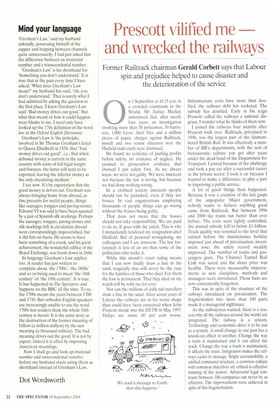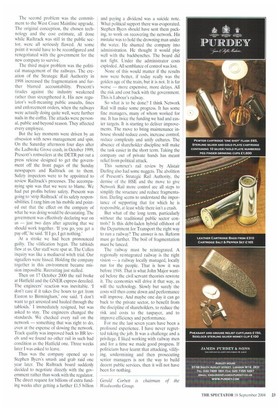Prescott vilified me and wrecked the railways
Former Railtrack chairman Gerald Corbett says that Labour spin and prejudice helped to cause disaster and the deterioration of the service
0 n 1 September at 10.15 a.m. in a crowded courtroom in the Strand, Mr Justice Mackay announced that, after nearly four years, an investigation involving more than 50 policemen, 30 barristers, 1,000 Lever Arch files and a million pieces of paper, charges against Railtrack, myself and two senior directors over the Hatfield train crash were dismissed.
He found no evidence of putting profits before safety, no evidence of neglect. He pointed to prosecution evidence that showed I put safety first. As we always knew, we were not guilty. We were innocent not because the law is wrong, but because we had done nothing wrong.
In a civilised society innocent people should not be punished, even if they are bosses. In vast organisations employing thousands of people things can go wrong without the bosses being guilty.
That does not mean that the bosses should not take responsibility. We are paid to do so. It goes with the patch. This is why I immediately tendered my resignation after Hatfield. But of personal wrongdoing, my colleagues and I are innocent. The law fortunately is less of an ass than some of the politicians who make it.
While this month's court ruling means that I can now finally draw a line in the sand, tragically that will never be the case for the families of those who died. For them the loss is permanent. That they died on my watch will be with me for ever.
Nor can the millions of daily rail travellers draw a line in the sand. After seven years of Labour the railways are in far worse shape than could have been conceived when John Prescott strode into the DETR in May 1997. Delays are some 60 per cent worse. Infrastructure costs have more than doubled, the railways debt has rocketed. The subsidy has doubled. Early in his reign Prescott called the railways a national disgrace. I wonder what he thinks of them now.
I joined the railways four months after Prescott took over. Railtrack, privatised in 1996, was the largest part of the dismembered British Rail. It was effectively a number of BR's departments, with the sort of bureaucratic culture you get after years under the dead hand of the Department for Transport. I joined because of the challenge and took a pay cut after a successful career in the private sector. I took it on because I wanted to make a difference, to play a part in improving a public service.
A lot of good things then happened. Because it was a creation of the last gasps of the unpopular Major government, nobody wants to believe anything good came from Railtrack. But between 1996 and 2000 the trains ran better than ever before. The costs were tightly controlled, the annual subsidy fell to below 11 billion. Track quality was restored to the level that existed before the maintenance holiday imposed just ahead of privatisation; investment rose; the safety record steadily improved. The number of trains and passengers grew. The Channel Tunnel Rail Link was saved and the share price was healthy. There were measurable improvements as new disciplines, methods and managers were introduced. These facts are now conveniently forgotten.
This was in spite of the structure of the railways introduced on privatisation. The fragmentation into more than 100 parts made it a managerial nightmare.
As the railwaymen warned, there is a reason why all the railways around the world are integrated. The railway is a system. Technology and economics drive it to be run as a system. A small change in one part has a knock-on effect in another. Change the way a train is maintained and it can affect the track. Change the way a track is maintained, it affects the train. Integration makes the railways easier to manage. Single accountability, a unified command structure, a common culture with common objectives are critical to effective running of the system. Adversarial legal contracts between 100 companies can never be as effective. The improvements were achieved in spite of this fragmentation. The second problem was the commitment to the West Coast Mainline upgrade. The original conception, the chosen technology and the cost estimate, all done while Railtrack was still in the public sector, were all seriously flawed. At some point it would have to be reconfigured and renegotiated with the government for the new company to survive.
The third major problem was the political management of the railways. The creation of the Strategic Rail Authority in 1998 increased the fragmentation and further blurred accountability. Prescott's tirades against the industry weakened rather than strengthened it. His new regulator's well-meaning public assaults, fines and enforcement orders, when the railways were actually doing quite well, were further nails in the coffin. The attacks were personal, public and beyond reason. They affected every employee.
But the key moments were driven by an obsession with news management and spin. On the Saturday afternoon four days after the Ladbroke Grove crash, in October 1999, Prescott's rottweilers at the DETR put out a press release designed to get the government off the front pages of the Sunday newspapers and Railtrack on to them. Safety inspectors were to be appointed to review Rai!track's processes. The accompanying spin was that we were to blame. We had put profits before safety. Prescott was going to 'strip Railtrack' of its safety responsibilities. I rang him on his mobile and pointed out that the effect on the company of what he was doing would be devastating. The government was effectively declaring war on us — just two days after agreeing that we should work together. 'If you go, you get a pay off,' he said. 'If I go, I get nothing.'
At a stroke we had been pronounced guilty. The vilification began. The tabloids flew at us. Our staff were spat at. The Cullen inquiry was like a mediaeval witch trial. Our signallers were hissed. Holding the company together in this environment became mission impossible. Recruiting just stalled.
Then on 17 October 2000 the rail broke at Hatfield and the GNER express derailed. The engineers' reaction was inevitable. 'I don't care if it takes five hours to get from Easton to Birmingham,' one said. 'I don't want to get arrested and hauled through the tabloids.' I immediately resigned, but was asked to stay. The engineers changed the standards. We checked every rail on the network — something that was right to do, even at the expense of slowing the network. Track quality was improved back to BR levels and we found no other rail in such bad condition as the Hatfield one. Three weeks later I was asked to leave.
Thus was the company opened up to Stephen Byers's smash and grab raid one year later. The Railtrack board suddenly decided to negotiate directly with the government rather than work with the regulator. The direct request for billions of extra funding weeks after getting a further £.1.5 billion and paying a dividend was a suicide note. What political support there was evaporated. Stephen Byers should have sent them packing, to work on recovering the network. His mistake was to hold the drowning man under the water. He shunted the company into administration. He thought it would play well with the backbenches. The board did not fight. Under the administrator costs exploded. All semblance of control was lost.
None of this would matter if the results now were better, if today really was the golden age of the train, but it is not. It is far worse — more expensive, more delays. All the risk and cost back with the government. This is Labour's railway.
So what is to be done? I think Network Rail will make some progress. It has some fine managers, many of whom worked for me. It has twice the funding we had and easier targets. It is starting to deliver improvements. The move to bring maintenance inhouse should reduce costs, increase control, reduce complexity and unify cultures. The absence of shareholder discipline will make the task easier in the short term. Taking the company out of private hands has meant relief from political attack.
This summer's rail review by Alistair Darling also had some nuggets. The abolition of Prescott's Strategic Rail Authority, the demise of the HSE and the move to give Network Rail more control are all steps to simplify the structure and reduce fragmentation. Darling seems to understand the importance of supporting that for which he is responsible, at least while there isn't a crash.
But what of the long term, particularly without the traditional public sector controls? Is this debt-laden hybrid offshoot of the Department for Transport the right way to run a railway? The answer is no. Reform must go further. The boil of fragmentation must be lanced.
The railway must be reintegrated. A regionally reintegrated railway is the right vision — a railway locally managed, locally run for the people. That is how it was before 1948. That is what John Major wanted before the civil servant theorists rewrote it. The economics will drive it that way, as will the technology. Slowly but surely the costs will then come down and performance will improve. And maybe one day it can go back to the private sector, to benefit from the discipline of shareholders, to reduce the risk and costs to the taxpayer, and to improve efficiency and performance.
For me the last seven years have been a profound experience. I have never regretted taking the job. It was a challenge and a privilege. I liked working with railway men and for a time we made good progress. If politicians have learnt that attacking, vilifying, undermining and then prosecuting senior managers is not the way to build decent public services, then it will not have been for nothing.
Gerald Corbett is chairman of the Woolworths Group.



















































































 Previous page
Previous page